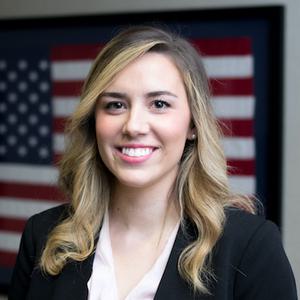
Health Care
Kaitlyn Finley | January 16, 2020
A glide path to more government control
Kaitlyn Finley
The Democratic presidential caucuses and primaries are fast approaching. A handful of presidential hopefuls continue to tout their radical “Medicare for All” health care plans, while others are pushing more “moderate” solutions. But don’t be fooled. Their endgame is one and the same: more government control over America’s health care system.
In Oklahoma, there are targeted efforts to increase the government’s reach in Oklahoma’s health care system by expanding Medicaid to hundreds of thousands of able-bodied adults under the Affordable Care Act (Obamacare).
Expansion proponents claim that expanding Medicaid (a program initially designed to help the truly needy) will “bring our tax dollars home” from Washington D.C. But in reality, Medicaid expansion will only bring more taxes home for Oklahoma taxpayers.
Supporters of Medicaid expansion have claimed the policy will pay for itself, and if any cost overruns do result, Washington will take care of it. But these claims do not hold water. As Paige Winfield Cunningham writes at The Washington Post, 13 states that have expanded Medicaid have had to raise taxes or fees to cover their portion of expansion costs. Using state data, the Foundation for Government Accountability (FGA), a nonpartisan think tank, found that taxpayers are paying 157 percent more for Medicaid expansion than what was promised by state officials.
Unfortunately, these enormous cost overruns have not translated into significant increases in health outcomes. Nor has Medicaid expansion stopped the closure of rural hospitals, according to Becker’s Hospital Review (see, for example, the recent rural hospital closures in Alaska, Arizona, Arkansas, California, Illinois, Kentucky, Maine, Massachusetts, Michigan, Nevada, Ohio, and other expansion states).
Expansion proponents also promised significant improvements in health outcomes due to increased physician participation. But despite spending billions of taxpayer dollars, there has been “no difference in overall rates of accepting new Medicaid patients” between states that did and did not choose to expand the program, according to a recent analysis from the Medicaid and CHIP Payment and Access Commission, a nonpartisan legislative branch agency. Medicaid services are only beneficial if one actually can see a provider who accepts Medicaid patients. It’s these patients who have Medicaid coverage yet still can’t see a doctor—particularly the traditional Medicaid patients—who are harmed.
When Medicaid was first created more than 50 years ago, it was focused on the blind and the disabled. Expansion has caused the program to balloon to an unsustainable level. And as more states jump on the expansion bandwagon, more and more resources will be taken away from traditional Medicaid recipients.
Even without Obamacare expansion, Oklahoma’s Medicaid program, SoonerCare, is already taking up a significant portion of Oklahoma’s state budget. Last year, Oklahoma’s portion of Medicaid costs topped out at more than $2.2 billion—an alarming 258 percent increase from $652 million just 20 years ago, according to data from the Oklahoma Health Care Authority. Total costs of the program, including federal match dollars, hit $5 billion, which accounts for nearly 28 percent of total state spending in fiscal year 2018.
But expanding Medicaid in Oklahoma is not the end goal for many progressives. It’s no surprise they claim policymakers must inject more government into healthcare to fix Obamacare. Their radical plans range from a Medicare-buy-in plan to a single-payer Medicare for All program.
By offering new health care plans, every Democratic candidate has conceded Obamacare, plan A, was a failure. And although some candidates oppose a single-payer system at the moment, they admit Medicare for All is sure to be coming down the pipeline. Presidential candidate Pete Buttigieg’s called his quasi-public option “Medicare-for-all-who-want it” plan a “glide path” to “Medicare for All.”
The Obamacare Exchange and the Medicaid expansion as seen in other states has not reduced services prices or scaled back premiums for families. Putting more individuals on government-sponsored health care plans, whether that is on Medicaid, subsidized exchanges, or a Medicare-buy-in option will only increase the government’s grip on America's health care system, resulting in higher prices and a greater need for more subsidies, tax dollars, and government-sponsored health plans.
Expansion proponents claim Oklahoma has no choice but to expand Medicaid in order to save its health care system. But there are better options. It’s true that there’s room for improving health care access in rural Oklahoma, but Oklahomans don’t have to expand welfare and raise taxes in order to do so. Better, more targeted, easier-to-implement solutions are being discussed at the state Capitol.
HJR 1017, introduced last legislative session, would direct future tobacco-settlement payments in the amount of $70 million annually to help struggling rural hospitals. A portion of this money could also be used to pay for medical school students who agree to practice in rural areas upon graduation, ensuring Oklahoma increases the number of providers in areas where there is the most need for years to come. No provision in any Medicaid expansion proposals would ensure this.
Oklahoma cannot afford to venture down this poor policy path. Don’t be mistaken—expansion means more taxes, more individuals on welfare, and more federal control over Oklahoma’s state budget. Before Oklahoma opts to expand welfare to a new class of able-bodied adults, policymakers must refocus their efforts on allowing greater competition and transparency in our state in order to lower health care costs for all Oklahomans.

Kaitlyn Finley
Policy Research Fellow
Kaitlyn Finley currently serves as a policy research fellow for OCPA with a focus on healthcare and welfare policy. Kaitlyn graduated from the University of Science and Arts of Oklahoma in 2018 with a Bachelor of Arts in Political Science. Previously, she served as a summer intern at OCPA and spent time in Washington D.C. interning for the Heritage Foundation and the U.S. Senate Committee on Environment and Public Works.